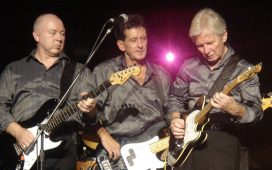‘I told them I was on my way out to meet some singer called Drake,” says writer Ronan Bennett, recalling the unlikely story of how he went out for dinner with the Canadian rapper and somehow managed to make himself seem less cool in front of his children. Drake was a fan of Top Boy, Bennett’s Channel 4 drama about the lives of drug dealers and residents on a fictional Hackney estate called Summerhouse. He had been recommended it while on tour and loved it so much, he began posting stills from the show on Instagram with clumsy attempts at London slang (“real bod man”). When he found out it had been cancelled, he decided to bring it back by teaming up with Bennett and pitching it to Netflix.
The pair arranged a dinner in London to thrash out a plan – much to the disbelief of Bennett’s kids, who had to inform him he was about to meet one of the biggest pop stars on the planet. “My children were like, ‘Whaaaaat?’” he says. “But honestly, I didn’t know who he was.”
Luckily for Bennett, Netflix and quite a few other people did. “He was into the show’s music,” says Kane Robinson – AKA Kano, the grime MC who starred in the original series as Sully, a duplicitous but driven dealer. “It wasn’t a shock that Drake liked it. What was more shocking was that when he posted about Top Boy, the reaction was mad. You’d wake up and have hundreds of messages.”
“He understands the culture and saw that [the show] needed to come back,” adds Ashley Walters, who plays Dushane, the titular Top Boy who rises from low-level street dealer to potential East End kingpin. “We were all on the same page – it just happens that he’s Drake.”
Drake fronted a pitch to Netflix in LA and an hour later they had a deal. But Top Boy wasn’t the easiest sell. Originally pitched to the BBC as a one-off TV film, the Beeb balked at the language and its stark gang-related subject matter, so Bennett shopped it to Channel 4, which commissioned it and greenlit a second season. The Independent called it “Britain’s answer to The Wire”, while Vice dedicated an oral history to the making of it. The show got a mixed reception from residents of Hackney when the Observer screened it to youth groups, but it was lauded by critics for its brutal portrayal of life in east London just after the 2011 riots.

Bennett can’t remember the reason Channel 4 gave for cancelling, but it felt “abrupt” and left him shocked – with a storyline for a third series that looked destined never to see the light of day. “I didn’t ever think it was going to come back,” says Robinson. “It looked like it was a non-starter.”
But despite the cancellation, Top Boy didn’t disappear completely. Both Robinson and Walters were asked about it incessantly as it began to find another audience, first on DVD and then on Netflix. It became a touchstone in the music world, with such grime acts as Skepta working references into his Mercury prize-winning album, Konnichiwa. It proved to be a hothouse of young black British talent: Michaela Coel had a bit-part in the original series, as did a pre-Black Panther Letitia Wright, who stood out as an ethically compromised young gang member. Other grime MCs, including Scorcher and Bashy, also featured before going on to get parts in films. In 2016, rumours that the show was coming back began circulating. Then, during his sold-out run at the O2 in London this April, Drake played a trailer confirming its return.
The UK has changed a lot since Top Boy’s debut in 2011, especially in the way gangs are viewed. The rise in knife crime has become part of the national conversation, with the media reporting on such concepts as “county lines”, in which drug gangs send young members to rural locations to drum up new trade. Drug dealers have never been more under the microscope, especially after 2018, when there were 135 homicides in London, 76 of them stabbings. So was there any hesitation in bringing back Sully and Dushane, dealers who manipulate young kids, murder rivals and use knives?
“No,” says Bennett without missing a beat. “I think it’s important to bring it back in that context.” Why? “I consider myself a highly political person in everything I do,” says the writer, who up until recently was the chair of his local Labour party. “But I never beat the audience over the head with a message. However, I don’t think anyone who watches Top Boy would fail to realise that the answer to the question ‘Why is knife crime happening?’ is simple. It’s poverty, exclusion and it’s racism. That’s why these kids feel completely outside the norms of a society that cold-shoulders them, that closes doors on them, that looks down on them, that despises them. And then it’s a spiral.
“They’re denied any kind of self-respect. Where are they going to find that respect? They need to feel good about themselves and they need to find that value somewhere. They create a different value system and it’s one that is deeply, deeply fucked up.”

Robinson and Walters think there is an urgent need to bring a gang drama to the screen, believing the new series will provide a vital window into a world that is still misunderstood. “The media’s attention [to gangs] is on another level,” says Robinson. “But who are we if we’re not talking about the current climate? What picture do people want us to paint? It’s not a true story but there are a lot of truths within it.”
“Whoever is outside looking in,” says Walters, “should see this as correspondence. You’re getting the people who are down there at street level reporting to the rest of the world. That’s what I see Top Boy as, that’s what I see Kane’s music as. It’s important for people to listen and take time to watch what’s going on in these shows, especially the ones like Top Boy that are painting an accurate picture.”

That picture isn’t pretty. In the new series, which will launch on Netflix in the autumn, there’s a glimpse of the harsh life inside British prisons, where disagreements from the street continue to fester. There are young men – still children, really – forced to look after their families and turn to drug-dealing to provide. An immigration story surfaces that has echoes of the Windrush scandal.
Top Boy has always been about showing the wider view of how societal pressures add to the chaos of street life. In the first two series, we see a salon owner and the manager of a chippy struggling to stay open as rents increase. A mother with mental health issues has to deal with her own problems and the needs of her son, who is perilously close to getting caught up in the drug game. For Bennett, that’s all a way to paint a fuller picture of life in breadline Britain.
“Until recently, we’d go around canvassing [for Labour] and you could literally smell poverty,” says Bennett. “It has a smell. It’s cheap, bad food. It’s damp and unwashed clothes. When they open that door, you think, ‘Would I like this life? No.’ That’s why this happens and that’s what Top Boy shows.”
Walters believes gentrification plays a part. “I think it’s one of the reasons why a lot of knife crime is happening,” he says. “What we’re not talking about is how people are being displaced – and how somewhere like Croydon has one of the highest knife crime rates because all the kids from Peckham, Brixton and the surrounding areas were being moved there – which created war, essentially, because all the kids were being mixed up together.”
Then there are middle-class drug users, who have been accused of fuelling the gang problem. A well-off couple appear in season three – is that who Bennett is skewering? “I’ve seen the whole debate about middle-class drug use,” says Bennett, who adds that he has never taken or bought drugs. “That obviously happens. I guess that’s something people have to confront, but for me the answer is decriminalisation. Nothing else works.” Would that include all drugs? “Yes. I’m in favour of decriminalisation but with regulation. I would say to my kids, ‘Please don’t do this. I think it’s bad for your health and taking drugs is really risky.’ But this is the way to make it less risky.”
Bennett points out that in the Shoreditch restaurant we’re sitting in, there are probably people who have bought or sold drugs that day. “Are they fuelling knife crime?” he asks, looking around. “I guess. But in a bigger way, it’s the entire apparatus that we’ve built around the so-called war on drugs that is responsible.”
There’s always been a bleak, nihilistic thread running through Top Boy, as young people without much hope struggle to simply get by. Can Bennett see things getting better in real life under a Boris Johnson government, with the hardline Priti Patel in the Home Office? “No, not remotely. If you handpicked a bunch of characters in Britain that have less intelligence, less sympathy and less understanding of the kind of social and economic backgrounds that our characters come from, you could not do a worse job. There is no hope that they will have any understanding of what it would take to solve this problem. They are unbelievably out of touch.”













